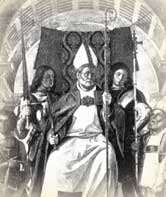
Let us say you belong to a big church in an important city like Chicago or London. Your pastor has just died. He taught a heretical doctrine--that Jesus wasn't really divine. Would your church riot over who to have as its next leader? Would it choose as its compromise candidate a lawyer who had never even been baptized?
That is just what happened in Milan, Italy, in 374. The bishop of Milan had supported the Arian heresy, which denied Christ was fully God. When he died, the Milanese rioted. Some wanted an Arian bishop. Others wanted an orthodox teacher.
Ambrose was a 35 year old lawyer in town, the son of a nobleman, and so skilled in oratory that the governor of Northern Italy had designated him as his successor. This intelligent young man pushed his way through the seething crowd and pleaded with them to maintain the peace. His arguments must have been persuasive: Someone shouted, "Ambrose for bishop!" and soon everyone had picked up the chant.
Ambrose protested. This was the furthest thing from his mind. Why, he hadn't even been baptized! But his protests were of no use. The people wanted him. When Emperor Valentinian approved the selection of Ambrose and threatened severe penalties against anyone who helped hide the lawyer, Ambrose gave in and was baptized.
Eight days later, on this day, December 7, 374,Ambrose was consecrated bishop of Milan. He took his new responsibilities seriously. He gave all his possessions to the poor and boned up on theology. With his legal skills and Greek learning, he defended the church and its people.
The oratorical skills of the lawyer did not desert him when he took the pulpit. He spoke ad lib, not writing out his sermons. These were so good that the great Augustine of Hippo was won to Christ through listening to him. Ambrose was a defender of orthodoxy against Arianism. He kept up a frequent correspondence with Basil the Great, a famed bishop of the Middle East. Because of Ambrose's writings, he is classed with Jerome, Augustine and Gregory the Great as one of the four Latin church fathers.
Bold where the church was concerned, Ambrose even barred Emperor Theodosius from entering the sanctuary until the ruler publicly repented of a massacre he had perpetrated in Thessalonica. One stipulation he placed on the emperor was that he must allow thirty days to elapse between ordering any death sentence and carrying it out, so that he would have time to cool down and change his mind if necessary.
He counseled gentleness rather than harshness with those who had betrayed the faith under torture. "Therefore the Lord Jesus had compassion upon us in order to call us to Himself, not frighten us away. He came in meekness, He came in humility, and so He said: 'Come unto Me, all ye that labor and are heavy laden, and I will refresh you.' So, then, the Lord Jesus refreshes, and does not shut out nor east off, and fitly chose such disciples as should be interpreters of the Lord's will, as should gather together and not drive away the people of God."
Ambrose died on Good Friday in 397. As he lay dying he extended his arms like Christ on the cross. Christ appeared to him in his last agony. His death made such an impression on the public that five bishops could hardly cope with all the people who requested to be baptized the next day.
Bibliography:
- "Ambrose, Saint, of Milan." New Schaff-Herzog Encyclopedia of Religious Knowledge. Grand Rapids: Baker Book House, 1954.
- "Ambrose, St." The Oxford Dictionary of the Christian Church. Edited by F. L. Cross and E. A. Livingstone. Oxford, 1997.
- Baring-Gould, S. Lives of the Saints. Edinburgh: John Grant, 1914.
- Bell, Mrs. Arthur. Saints in Christian Art. London: George Bell, 1901 - 1904. Source of the image.
- Butler, Alban. Lives of the Saints. Westminster, Maryland: Christian Classics, 1981, 1956.
- Durant, Will. The Age of Faith; A history of Medieval civilization--Christian, Islamic and Judaic--from Constantine to Dante: AD 325 - 1300. The Story of Civilization, Part IV. New York: Simon and Schuster, 1950.
- Loughlin, James F. "St. Ambrose." The Catholic Encyclopedia. New York: Robert Appleton, 1914.
- Wand, J. W. C. The Latin Doctors. London: Faith Press; New York: Morehouse-Gorham, 1948.
- Various encyclopedia and internet articles.